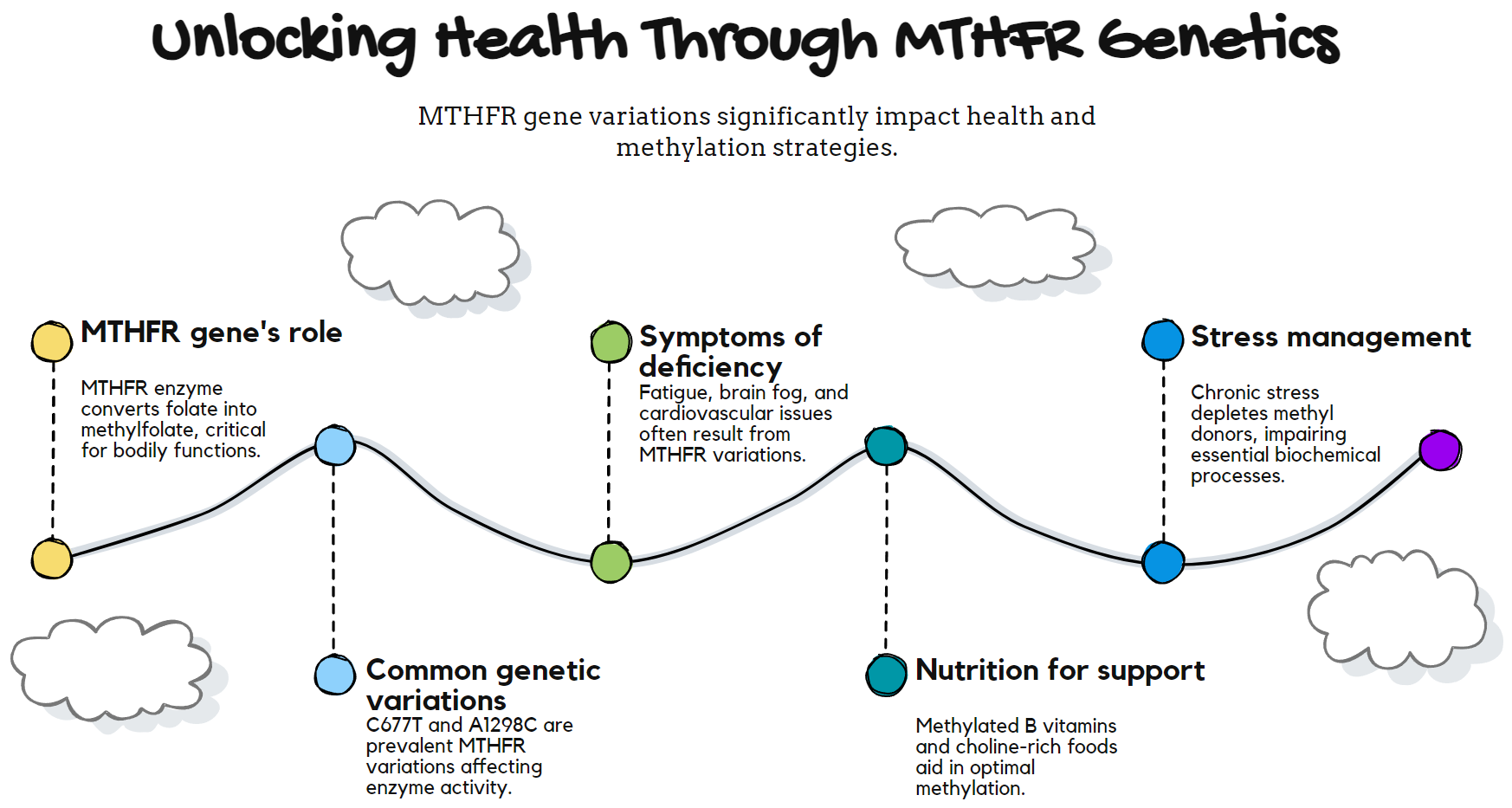
The Genetic Switch Affecting 85% of People's Health
The Genetic Switch Affecting 85% of People's Health
Your genetic code contains a secret that affects how every cell in your body functions. Hidden within your DNA, a single letter change might explain why specific health strategies work for others but not for you.
This secret lies in a gene called MTHFR.
Far from being rare, MTHFR variations affect up to 85% of the general population, making them among the most common genetic differences influencing biochemical function. Yet most people remain unaware of how these variations impact their health.
Understanding MTHFR and Methylation
MTHFR stands for methylenetetrahydrofolate reductase. This enzyme is critical in converting folate (vitamin B9) into its active form, methylfolate.
This conversion isn't just another biochemical reaction. It's the cornerstone of methylation.
Methylation affects virtually every system in your body. It influences DNA repair, neurotransmitter production, detoxification, immune function, and cardiovascular health. When methylation works properly, your body efficiently manages these processes.
When it doesn't, the effects can be far-reaching.
The Impact of MTHFR Variations
MTHFR gene variations, known as Single Nucleotide Polymorphisms (SNPs), alter the effectiveness of the enzyme's function. The most studied variations are C677T and A1298C.
The effects depend on whether you have one variant copy (heterozygous) or two (homozygous).
Individuals with the C677T homozygous mutation have approximately 70% reduced enzyme activity. Those with a heterozygous variant still experience about 35% reduced activity. This significantly affects their ability to convert folate into its active form.
When the MTHFR function decreases, several problems can develop:
Elevated homocysteine levels. This inflammatory marker increases the risk of cardiovascular issues.
Neurotransmitter imbalances. Methylation helps produce and regulate serotonin, dopamine, and norepinephrine.
Detoxification challenges. Proper methylation supports your body's ability to clear toxins.
DNA repair issues. Methylation helps protect DNA integrity and regulate gene expression.
The daily symptoms might include fatigue, brain fog, mood disorders, inflammatory conditions, and cardiovascular concerns.
Why These Variations Persist
If MTHFR variations can cause health challenges, why are they so common? The answer lies in evolutionary trade-offs.
These variations likely offered advantages in certain environments or against specific diseases. For instance, some research suggests certain MTHFR variants may protect against particular cancers.
Our modern environment, however, often magnifies the downsides of these variations.
Supporting Methylation Despite Genetic Variations
Understanding your MTHFR status can transform your approach to health. While you can't change your genes, you can support optimal function despite these variations.
The most direct approach involves nutrition and supplementation:
Methylated B vitamins. Research shows that taking methylfolate (5-MTHF) may help people with MTHFR variants bypass the enzyme limitation. Unlike folic acid, methylfolate doesn't require conversion by the MTHFR enzyme.
Methylated B12. Methylcobalamin works synergistically with methylfolate to support methylation pathways.
Choline-rich foods. Eggs, liver, and cruciferous vegetables provide alternative methyl donors.
Antioxidant support. NAC, glutathione, and vitamin C help manage oxidative stress resulting from impaired methylation.
Beyond supplements, lifestyle factors significantly impact methylation:
Reduce toxin exposure. Minimize alcohol, processed foods, and environmental toxins that burden detoxification pathways.
Manage stress. Chronic stress depletes methyl donors and impairs methylation efficiency.
Optimize sleep. Quality sleep supports proper methylation cycling.
Personalized Approach to Methylation Support
While general recommendations provide a starting point, methylation support benefits from personalization. Each person's biochemical needs differ based on their genetic variations, environmental exposures, and current health status.
Testing can provide valuable insights:
Genetic testing. Identifies specific MTHFR variants and other genes affecting methylation.
Functional testing. Measures homocysteine, methylation metabolites, and nutrient status.
These tests help create targeted protocols that address your unique methylation challenges.
The Future of Methylation Medicine
Research into MTHFR and methylation continues to evolve. Scientists are discovering increasingly nuanced connections between methylation status and health conditions ranging from mental health disorders to autoimmune conditions.
The growing field of epigenetics examines how environmental factors influence gene expression through methylation patterns. This research suggests that supporting proper methylation may help mitigate genetic predispositions to certain conditions.
As testing becomes more accessible and treatments more refined, personalized methylation support will likely become a cornerstone of preventive health care.
Beyond MTHFR
While MTHFR variations significantly impact methylation, they represent just one piece of the genetic puzzle. Other genes involved in methylation pathways include COMT, CBS, MTRR, and MTR.
These genes work together in complex networks. Understanding how they interact provides a more complete picture of your biochemical individuality.
The goal isn't perfect genes. It's optimal function despite genetic variations.
Taking Action
Knowledge about MTHFR variations empowers personalized health decisions. Rather than following generic health advice, you can target the specific biochemical pathways that need support.
For many, addressing methylation represents the missing link in their health journey. When methylation improves, seemingly unrelated symptoms often resolve.
The most powerful approach combines awareness of genetic predispositions with proactive lifestyle choices that support optimal biochemical function.
Your genes may set boundaries. But within those boundaries, you have remarkable power to influence how your genes express themselves.
Understanding MTHFR variations offers a window into your biochemical individuality. Through this window, you gain access to personalized approaches that can transform your health at the cellular level.
